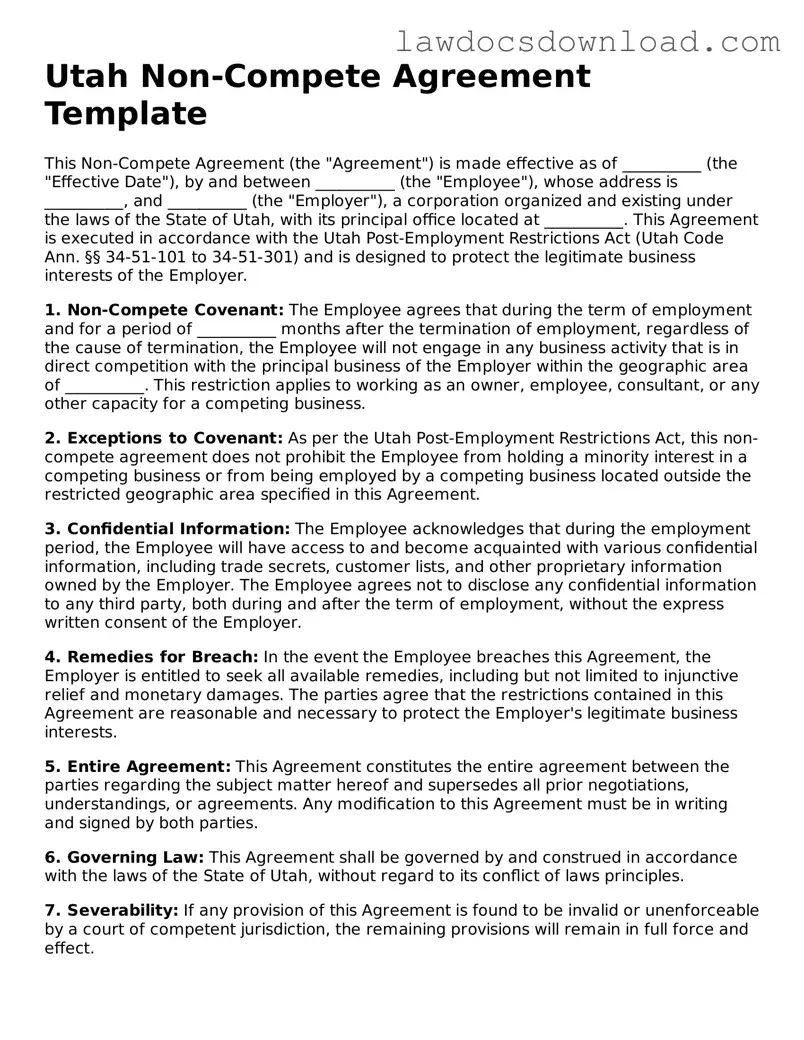Utah Non-Compete Agreement Template
This Non-Compete Agreement (the "Agreement") is made effective as of __________ (the "Effective Date"), by and between __________ (the "Employee"), whose address is __________, and __________ (the "Employer"), a corporation organized and existing under the laws of the State of Utah, with its principal office located at __________. This Agreement is executed in accordance with the Utah Post-Employment Restrictions Act (Utah Code Ann. §§ 34-51-101 to 34-51-301) and is designed to protect the legitimate business interests of the Employer.
1. Non-Compete Covenant: The Employee agrees that during the term of employment and for a period of __________ months after the termination of employment, regardless of the cause of termination, the Employee will not engage in any business activity that is in direct competition with the principal business of the Employer within the geographic area of __________. This restriction applies to working as an owner, employee, consultant, or any other capacity for a competing business.
2. Exceptions to Covenant: As per the Utah Post-Employment Restrictions Act, this non-compete agreement does not prohibit the Employee from holding a minority interest in a competing business or from being employed by a competing business located outside the restricted geographic area specified in this Agreement.
3. Confidential Information: The Employee acknowledges that during the employment period, the Employee will have access to and become acquainted with various confidential information, including trade secrets, customer lists, and other proprietary information owned by the Employer. The Employee agrees not to disclose any confidential information to any third party, both during and after the term of employment, without the express written consent of the Employer.
4. Remedies for Breach: In the event the Employee breaches this Agreement, the Employer is entitled to seek all available remedies, including but not limited to injunctive relief and monetary damages. The parties agree that the restrictions contained in this Agreement are reasonable and necessary to protect the Employer's legitimate business interests.
5. Entire Agreement: This Agreement constitutes the entire agreement between the parties regarding the subject matter hereof and supersedes all prior negotiations, understandings, or agreements. Any modification to this Agreement must be in writing and signed by both parties.
6. Governing Law: This Agreement shall be governed by and construed in accordance with the laws of the State of Utah, without regard to its conflict of laws principles.
7. Severability: If any provision of this Agreement is found to be invalid or unenforceable by a court of competent jurisdiction, the remaining provisions will remain in full force and effect.
IN WITNESS WHEREOF, the parties have executed this Non-Compete Agreement as of the Effective Date first above written.
Employee Signature: __________
Printed Name: __________
Date: __________
Employer Signature: __________
Printed Name: __________
Title: __________
Date: __________

